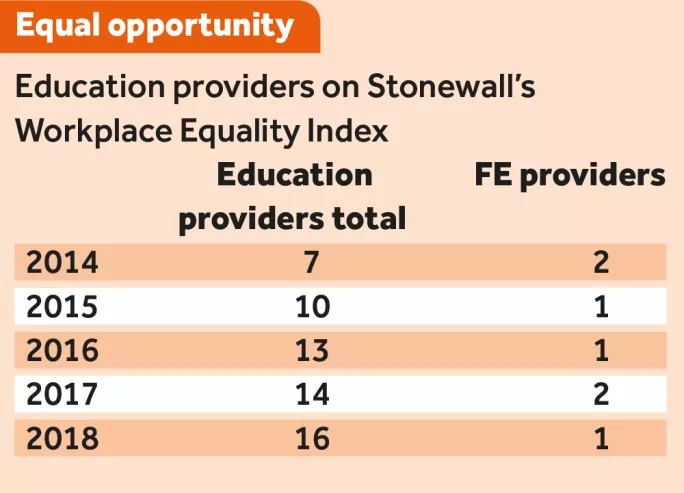
FE is put in the shade when it comes to equality

College offers the thousands of young learners who enrol on courses each year a chance to start afresh. This makes it an exciting - and also daunting - prospect for many. But for LGBT students, going to college can bring with it a whole extra set of challenges.
While the campus can be a place to explore identities and meet like-minded people, perhaps for the first time, for many young people, the environment is not conducive to being themselves.
Research shows that a significant proportion of LGBT students in further education experience bullying and harassment linked to sexual orientation and/or gender identity in their place of learning.
And this is not an issue for students alone. The Pride and Prejudice in Education report, published in February 2016, showed that one-in-three FE staff reported seeing another colleague act aggressively towards someone because of their sexual orientation.
Another conclusion of the study is that the learning environment in FE is often less welcoming for LGBT learners than universities. So what exactly is it that universities are doing that colleges seemingly do not?
One clear thing that colleges are not doing is engaging with LGBT charity Stonewall’s Workplace Equality Index.
The list - which has become a benchmark for the “Top 100” inclusive employers in the UK - provides an endorsement of an organisation’s equality policies.
A total of 434 employers entered this year through a process of self-nomination and the 2018 index includes 16 employers from the education sector. However, the only FE college to be selected is Newham College; this compares with 14 universities.
The London college has featured on the list for seven of the past 10 years; no Scottish FE institution has been listed in that time.
“We encourage all organisations, including FE institutions, to take part in our annual Workplace Equality Index,” says Stonewall director Pete Holmes. “More FE institutions can follow Newham College’s lead and come out for LGBT equality in the workplace.”
Sending signals
Ian Pretty, chief executive of the Collab Group of colleges, says he is shocked that more colleges are not featured on a list that seeks to showcase how much an organisation cares about inclusivity.
“Does the FE sector take seriously the importance of things like Stonewall? Does it take seriously that LGBT employees feel that the company or organisation they work for is a positive role model for other LGBT people or not?” he asks. “Not participating in this sends out a signal.”
Leo Siebert, NUS Scotland’s LGBT officer, says that colleges could be doing much more: “From enforcement of zero-tolerance policies regarding homophobia and transphobia, to supporting students’ associations to run LGBT societies, there are many actions that our colleges can and should be taking to make our campuses LGBT-friendly places for students and staff alike.
“Equally, colleges should look at the projects and resources already available across the education sector, like TransEdu and LGBT Youth Scotland’s Charter for Schools, to see which areas of best practice can be shared.” (LGBT Youth Scotland’s recent survey of young people, its first in five years, suggested that colleges were better places to be LGBT than schools - see bit.ly/ReportLGBT.)
Siebert adds: “If we want our campuses to be truly accessible, and reflect society, every college needs to be engaging LGBT students and empowering them to make changes that will help the LGBT students of the future.”

Shona Struthers, chief executive of Colleges Scotland, says that Scottish colleges have equality and fairness “at their heart”. “Colleges, including Edinburgh, South Lanarkshire and Borders, have been recognised and awarded for their work by LGBT Youth Scotland in supporting students and staff in tackling homophobia, biphobia and transphobia,” she says.
“Colleges will continue to build on best practice to prevent discrimination and promote equalities across all campuses, and we agree with Stonewall Scotland’s conclusion in its Experiences of LGBT People in Post-16 Education report that ‘Colleges should continue to promote a positive, inclusive ethos to encourage LGBT learners to continue into FE.’”
A spokesman for the EIS teaching union, which represents FE lecturers, says: “Many staff have reported that their colleges provide generic pastoral support for LGBT students but little that was targeted, tailored, or proactive. Colleges should ensure that efforts to support LGBT students and staff create inclusive environments reach across departments and campuses. Institutions should support and encourage staff to tackle discrimination wherever it arises, offering training and support where needed.”
You need a Tes subscription to read this article
Subscribe now to read this article and get other subscriber-only content:
- Unlimited access to all Tes magazine content
- Exclusive subscriber-only stories
- Award-winning email newsletters
- Unlimited access to all Tes magazine content
- Exclusive subscriber-only stories
- Award-winning email newsletters
You need a subscription to read this article
Subscribe now to read this article and get other subscriber-only content, including:
- Unlimited access to all Tes magazine content
- Exclusive subscriber-only stories
- Award-winning email newsletters
- Unlimited access to all Tes magazine content
- Exclusive subscriber-only stories
- Award-winning email newsletters